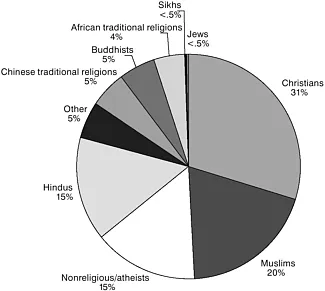1 Religion and the philosophy of religion
Religion and the world religions
Philosophy and the philosophy of religion
Philosophy of religion timeline
Religious beliefs and practices
Summary
Questions for Review/Discussion
Further reading
Websites
RELIGION AND THE WORLD RELIGIONS
Sigmund Freud (1856–1939), one of the great psychologists of the twentieth century, wrote that religion is comparable to a childhood neurosis.1 If this is so, the world is filled with something like five billion neurotic individuals. As I type these words, in sheer numbers there are roughly two billion Christians, consisting of Roman Catholics, Protestants, and Orthodox; there are well over a billion Muslims, close to 80 percent of whom are Sunni and 20 percent Shiite; there are over a billion Hindus; roughly 350 million Buddhists (Theravada and Mahayana); approximately 350 million adherents of the Chinese traditions of Confucianism and Daoism; about 300 million adherents of African traditional religions (Animists, Shamanists, etc.); 25 million Sikhs; 14 million Jews; 7 million Baha’i; 4 million Jains, and the list goes on (see Figure 1.12). And the religious traditions are not limited to geographic regions. Western religions have migrated East and Eastern religions have traveled West. As a case in point, Diana Eck – Director of the Pluralism Project at Harvard University – has pointed out that the formerly “Christian country” of the United States has now become the most religiously diverse nation in the world, with millions of adherents of Eastern as well as Western religions.3 Worldwide, nonreligious people are clearly in the minority, making up only about 15 percent of the world’s population.
No doubt, religion is ubiquitous. Nevertheless, attempting to offer a definition of religion which captures all and only what are taken to be religions is notoriously difficult. Central to some religions is a personal God and other spiritual entities; for other religions, there is no God or spirits at all. Some religions view the eternal, personal existence of the individual in an afterlife as paramount to understanding Ultimate Reality and much more important than temporary earthly existence. Others see what we do in this life as fundamental, with little if any consideration of the hereafter. Other differences among the religions abound.
But as diverse as religions are, several components seem to be central to the world religions: a system of beliefs, the breaking in of a transcendent reality, and human attitudes of ultimate concern, meaning, and purpose. Given these three elements, the following perhaps captures what most take to be the essence of the concept of religion: a religion involves a system of beliefs and practices primarily centered around a transcendent Reality, either personal or impersonal, which provides ultimate meaning and purpose to life.4
While this is not a book on world religions, work in the philosophy of religion would be deficient without taking into consideration the diversity of beliefs among at least the major religious traditions. It would be an enormous task to include all of what are commonly taken to be the major religions (and I consider the list above to be fairly inclusive of the world religions) in a textbook such as this one, so limitation is necessary. This delimiting process was not easy, but several factors made it more manageable than it could have been.
Figure 1.1 World religions
First, since I am writing from within the English-speaking world and am most familiar with the traditions predominant within it, it makes sense to emphasize them over others. For someone else with a different background and writing from a different place, other emphases would be appropriate. So, emphasis will be placed on the monotheistic religions of Judaism, Christianity, and Islam. Historically, the monotheistic traditions have included the belief that there is only one God – a personal God who is omniscient (all-knowing), omnipotent (all-powerful), and omnibenevolent (completely good in every way), and thus worthy of worship. This God is the creator and sustainer of the world. Furthermore, a distinction is often made among monotheists between theists, who believe that God is distinct from the world and yet actively involved in the world (guiding human history, for example, and offering divine revelation); deists, who believe that God is distinct from the world and not actively involved in the world; and panentheists, who believe that God permeates and is co-dependent with the world.
Second, besides the monotheistic traditions, Hinduism and Buddhism have also received more attention by philosophers of religion in the English-speaking world than other traditions have received. The school of thought within Hinduism which has received the most attention is Advaita Vedānta (“Advaita” is a Sanskrit term which means “non-dual,” and “Vedānta” means pertaining to the Hindu scriptures called the Vedas). The view of God, or Brahman, for those affirming Advaita Vedānta is called monistic pantheism (“monism” is from the Greek term monus which means “one” or “single”; “pantheism” is from the G...

